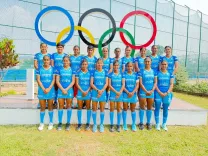ISRO and IIT Madras Create Homegrown Semiconductor Chip for Space Use
Synopsis
Key Takeaways
- IRIS chip developed for space applications.
- Based on SHAKTI processor architecture.
- Supports indigenization of semiconductors for ISRO.
- Contributes to Make in India initiative.
- Flight testing of the chip is planned.
Chennai, Feb 11 (NationPress) Researchers at the Indian Space Research Organization (ISRO) and the Indian Institute of Technology (IIT) Madras have successfully engineered a semiconductor chip tailored for space applications.
The newly developed ‘IRIS’ (Indigenous RISCV Controller for Space Applications) chip is based on the ‘SHAKTI’ processor architecture. Its versatility extends beyond space, finding applications in areas such as IoT and computing systems for strategic purposes.
This innovation is part of ISRO's commitment to indigenizing semiconductors crucial for its operations, command and control systems, and other essential functions, aligning with the initiative of ‘Atmanirbhar Bharat’ in space technologies.
“This achievement is a significant milestone in the ‘Make in India’ initiative for semiconductor design and production,” stated Dr. V Narayanan, Chairman of ISRO.
“I am confident that this high-performance controller, designed to meet our specific needs, will play a vital role in future embedded controllers for space missions. A flight test of a product based on this controller is planned soon, and its performance will be validated,” he further commented.
Narayanan expressed his contentment with the successful end-to-end development of the IRIS Controller using indigenous resources.
The ISRO Inertial Systems Unit (IISU) based in Thiruvananthapuram originated the concept for a 64-bit RISC-V-based Controller and worked alongside IIT Madras to finalize the specifications and design of the semiconductor chip.
The chip's design meets the common functional and computational needs of current sensors and systems utilized in ISRO missions. It features fault-tolerant internal memories linked to the SHAKTI core, thereby enhancing the design's reliability.
“Following the creation of RIMO in 2018 and MOUSHIK in 2020, this is the third SHAKTI chip fabricated at SCL Chandigarh and successfully booted at IIT Madras. The complete process of chip design, fabrication, packaging, motherboard design, assembly, software integration, and booting—all carried out in India—serves as further proof that our country possesses a comprehensive semiconductor ecosystem and expertise,” remarked Prof. V. Kamakoti, Director of IIT Madras.










